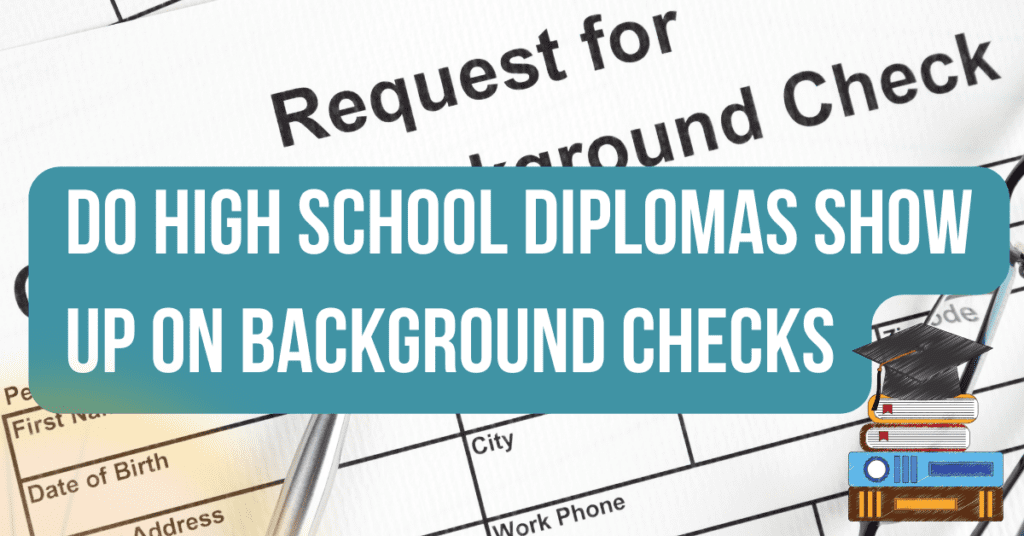In today’s competitive job market, background checks have become a standard practice for employers to evaluate potential candidates. One of the key elements scrutinized during these checks is the educational background of an individual, including whether they have obtained a high school diploma. In this comprehensive guide, we will explore the significance of high school diplomas in background checks, shedding light on common questions and concerns.

Understanding Background Checks:
Before delving into the role of high school diplomas in background checks, it’s crucial to grasp the overall purpose of these screenings. Employers conduct background checks to assess a candidate’s suitability for a position by verifying their identity, employment history, criminal record, and educational qualifications. While each element plays a vital role, the focus here will be on the educational aspect, particularly high school diplomas.
The Importance of High School Diplomas:
Basic Educational Requirement:
A high school diploma is often considered a basic educational requirement for many entry-level positions. It demonstrates a fundamental level of education and the ability to complete a standard course of study. Background checks verify whether an individual has met this fundamental educational milestone.
Job-Specific Requirements:
Some professions may have specific educational prerequisites. Employers in certain industries may require a high school diploma as a minimum qualification. For instance, administrative roles, customer service positions, and retail jobs may prioritize candidates with a high school diploma.
Credibility and Reliability:
A high school diploma serves as an indicator of a person’s commitment to education and their ability to follow through with long-term goals. Employers often view this credential as a sign of reliability and responsibility, qualities essential in the workplace.
Do high school diplomas show up on background checks?
Verification Process:
Background checks typically involve a verification process where the information provided by the candidate is cross-referenced with official records. In the case of high school diplomas, employers may contact the educational institution or use third-party services to confirm the authenticity of the diploma.
Public Records:
Educational achievements, including high school diplomas, are not private information. They are part of an individual’s public records, making it accessible to potential employers during background checks. However, it’s essential to note that employers must adhere to privacy laws and regulations when conducting these checks.
Accuracy of Information:
Accurate and honest information on a resume is crucial. Any discrepancies between the information provided by the candidate and the verified records could raise concerns for employers. Therefore, it’s imperative for individuals to be truthful about their educational background.
Addressing Common Concerns:
Impact on Employment Opportunities:
While a high school diploma is often a basic requirement, not having one may not automatically disqualify a candidate. Some employers prioritize skills and experience over formal education. However, lacking a high school diploma might limit opportunities in certain industries and professions.
Gaps in Education:
Individuals who have not completed high school may worry about how this gap in education will be perceived. It’s important to focus on showcasing other skills, experiences, and qualifications that make one a valuable asset to the prospective employer.
Alternative Credentials:
In some cases, individuals may have alternative credentials, such as a General Educational Development (GED) certificate. Employers may consider these equivalents to a high school diploma, so it’s essential to communicate such achievements transparently.
Get a high school diploma background check with PDX Fingerprinting
In your quest for a thorough background check, consider partnering with PDX Fingerprinting for a seamless and reliable process. PDX Fingerprinting specializes in comprehensive background checks, including the verification of high school diplomas. With a reputation for accuracy and efficiency, they employ advanced fingerprinting technology and professional expertise to ensure the authenticity of educational credentials.
PDX Fingerprinting’s commitment to excellence is evident in their meticulous verification procedures, providing clients with a comprehensive overview of an individual’s educational background. This includes confirming the attainment of a high school diploma, a crucial aspect often scrutinized by employers during the hiring process.
Our services not only meet industry standards but also adhere to legal and privacy regulations, instilling confidence in the integrity of the information obtained.
By choosing PDX Fingerprinting, you are opting for a trusted partner dedicated to delivering reliable results. Their streamlined process not only saves time but also offers peace of mind, knowing that the high school diploma background check is conducted with the utmost precision.
Faq’s
I never graduated high school and lied to get the job. Will they find out?
If you lie about graduating from high school and an employer conducts a background check, there is a high likelihood that the deception will be exposed. Background checks are standard procedures in the hiring process for many employers, and they often include the verification of educational credentials. Employers may use various methods to confirm this information, such as contacting the educational institution directly or utilizing third-party verification services.
If your claimed high school graduation is not substantiated by the verified information obtained during the background check, it can have severe consequences. Misrepresenting your educational qualifications can result in the loss of trust from the employer, jeopardize your job offer, or even lead to termination if you are already employed.
How many employers actually verify diplomas?
The extent to which employers verify diplomas can vary widely. While not every employer conducts rigorous background checks that include the verification of educational credentials, many reputable companies and organizations do prioritize this aspect during the hiring process.
Employers who seek candidates with specific educational qualifications or state that a high school diploma is a requirement for a position are more likely to verify diplomas. This is particularly common in industries where certain levels of education are considered essential for the role.
Large corporations, government agencies, and positions that involve significant responsibilities or specialized skills often have a more thorough background check process, which may include verifying educational qualifications. On the other hand, smaller businesses or positions with less stringent requirements may not invest as much in background checks, including diploma verification.
Do employers who say they require an applicant have a high school diploma actually check?
Employers who explicitly state that a high school diploma is a requirement for an applicant often do check educational credentials during the hiring process. This is particularly true for positions where a certain level of education is considered essential for the role. Such requirements are usually outlined in job listings to ensure that candidates possess the foundational knowledge and skills necessary to perform the job successfully.
In many cases, employers conduct background checks that include verifying educational qualifications to ensure that applicants meet the stated criteria. The verification process may involve contacting the educational institution directly or using third-party services to confirm the authenticity of the high school diploma.
Conclusion:
In conclusion, high school diplomas play a significant role in background checks, serving as an essential benchmark for employers to assess a candidate’s educational background and reliability. While not having a high school diploma may pose challenges in certain industries, it’s not an insurmountable obstacle. Honesty, transparency, and a focus on other qualifications and skills can help individuals navigate the job market successfully. As the employment landscape evolves, it’s crucial for both employers and job seekers to adapt to changing expectations and requirements.

